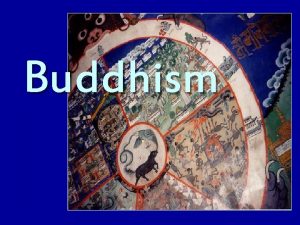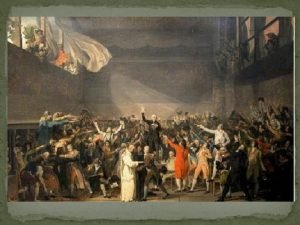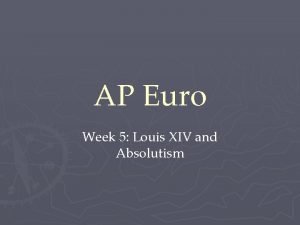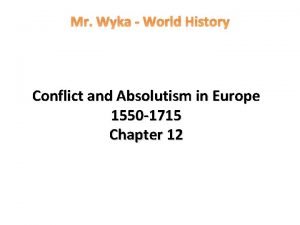Enlightened Despotism Russia Section 8 38 Introduction Russia














- Slides: 14

Enlightened Despotism: Russia Section 8. 38

Introduction • Russia embraced French culture • Didn’t contribute to intellectual revolution of 17 th century • Passively received the Enlightenment through France • Upper Class adopted French language and culture – westernization further divides them from the lower classes Peter the Great allowed upper class women to take part in social life at dinners and balls.

Russia after Peter the Great • Peter the Great died in 1725 • Decreed each Tsar name own successor (killed Alexis) • Instability followed the death of Peter I (Great) as competing factions vie for the throne • German faction and Russian faction • Succeeded by wife Catherine I (peasant origin) • Peter II (son of Alexis) ruled from (1727 -30) • Anna (1730 -40) and Ivan VI (1740: < a year) • Elizabeth (1740 -1761) (Peter I’s daughter) – Led Russia into 7 Years’ War against Prussia Peter III (Peter Feodorovich) Emperor Of All Russia (1761 -1762) • Peter III (1762) • 6/22/1762 he is overthrown by a coup led by his wife – Considered a half wit, physically and mentally weak – Murdered on July 7, 1762 by Count Grigory Orlov • Cause of so much violence = No principle of Grigory succession Orlov

• • • Catherine the Great 1762 – 1796: Domestic Program Of German heritage – Came to Russia at 15 to be married – Learned Russian, became Orthodox, hated Peter III Robust and vigorous – Had many, many lovers – Got up a 5 AM, lit her own fire, – Intelligent • Corresponded with Voltaire, bought Diderot’s library, benefactor to Philosophes Instituted reforms Catherine the Great of Russia – Summoned Legislative Commission in 1767 – Gathered info on nation, checked for individuals’ loyalty

Catherine the Great 1762 – 1796: Domestic Program Continued • Reforms – Legal codification – Restrictions on the use of torture – Support of religious toleration • But wouldn’t allow Old Believers to build chapels – Rearranged administrative districts from 10 to 50 gubernii

Pugachev’s Rebellion • • Condition of serfs was deteriorating Sold, separated from families, used in mines Old Believers aggravated the problem – Kept Stephen Razin’s memory alive Muzhiks (Russian peasants) were anti. French – Saw Boyars as cultural traitors Pugachev claimed to be Peter III (back from Egypt) Really a Don Cossack (settlers of Don River), former soldier Declares the end of taxes, serfdom, and conscription Joined by hundreds of thousands (Tartars, Kirghiz, Cossacks, serfs) – Pillaged, murdered priests, landlords

Pugachev’s Rebellion • Famine (1774) the undoing of the revolution • Pugachev captured, drawn and quartered – Catherine had prohibited the use of torture at his trial • Reaction to the rebellion is repression • Power is conceded to the landlords – Had dictatorial power over their own serfs • Condition of the serfs deteriorates into slavery • Moscow Gazette: “For sale, two plump coachmen, two girls 18 and 15, quick at manual work, two barbers…” Emelian Pugachev 1740 -1775

Russia before Catherine’s Expansion Reaches the Pacific and Central Asia Moscow only 200 miles from Polish threat No access to Black Sea Eastern Question

Expansionism of Catherine • • • Hoped to settle Eastern Question (territory of Ottoman Empire) – 1772 developed the Greek project • Planned to replace Muslims with Greek Orthodox in Anatolia – Russo-Turkish Wars (1768 -74, 178792) in alliance with Austria, planned the partition of the Ottoman Empire – Coveted Constantinople (warm water port) blocked by European balance of power – designs aroused alarm in Prussia and Great Britain • saw its dominance in the Mediterranean threatened by Russian ambitions. 1772 Catherine is appeased with first partition of Poland

Expansionism of Catherine • 1774 signed treaty at Kuchuk Kainarji on Danube and founded Odessa – gave Russia territorial gains, the role of protector of Greek Orthodox subjects, allowed Russian shipping to pass through the Straits • Catherine wanted to gain Austrian backing in next war with Turks • showed Joseph II artificial on-street villages designed by her lover Potemkin – lined with Happy villagers – has come to mean bogus evidence of nonexistent prosperity • War got sidetracked by French Revolution • Catherine encourged Prussia and Austria to war with France in the name of the Ancien Regime • Meanwhile she finished off Poland in 1795 (third partition of Poland)

1795 the third partition of Poland Expansion of Catherine the Great 1772 developed the Greek project 1774 treaty at Kuchuk Kainarji on Danube and founded Odessa

A tale of two Czars • • • Catherine is torn between East and West Absolutist – Limited reform is realized – The nobility is stronger than under Peter – Serfdom is indistinguishable from slavery Enlightened despot – Tuned in to the west – Recognized the standards of the Enlightenment – Groomed Alexander I for leadership with a western education

• • • Limitations of Enlightened Despotism Catherine needed consent of Boyars Kept tradition of coup d’ etat in her mind “You write only on paper, but I have to write on human skin, which is incomparably more irritable and ticklish. ” to Diderot Revolution from above Governments told people that reform was needed Special privileges are bad Past ways are ineffective States are sovereign Old established rights are questioned Jesuits are a barrier to progress Legal systems are made uniform Citizens are made more equal

Resistance • • • King is a hereditary ruler – revolution cannot be achieved by undoing the foundation of its power Appeasements required by the nobility – Europe saw a feudal reactionary movement beginning to take place Religion challenged the authority of the enlightened rulers French Revolution is threatening the old orders Monarchy had run its course – Viewed as backward, medieval Liberalism was about to assert itself
 Enlightened absolutism def
Enlightened absolutism def Absolute despotism
Absolute despotism Which letter represents the danube river?
Which letter represents the danube river? Frederick the great catherine the great enlightened despot
Frederick the great catherine the great enlightened despot Enlightened absolutism definition
Enlightened absolutism definition Enlightenment absolutism definition
Enlightenment absolutism definition What is enlightened absolutism?
What is enlightened absolutism? Enlightened one in buddhism
Enlightened one in buddhism Enlightenment ideas
Enlightenment ideas Louis xiv ap euro
Louis xiv ap euro Lesson 3 enlightened absolutism and the balance of power
Lesson 3 enlightened absolutism and the balance of power The enlightened target
The enlightened target The enlightened target
The enlightened target History of conflict
History of conflict Enlightened absolutism definition world history
Enlightened absolutism definition world history























